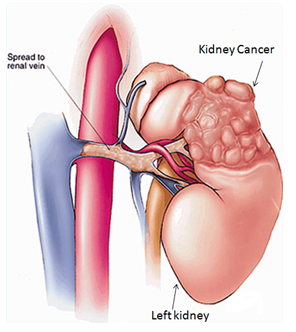Causes of Kidney Cancer
Kidney cancer is more often seen in men older than 40 years. And, although there is no straightforward reason, there are many risk factors that may increase the chances of the disease like:
- Genetics
- Smoking
- Obesity
- High Blood Pressure
- Long-term exposure to certain chemicals
- Unhealthy lifestyle
Types of Kidney Cancer
There Are Different Types Of Kidney Cancer
-
Renal cancer
Develops in the renal tubes that clean the impurities from the blood, is the most common type of cancer that affects adults
-
Urothelial cancer
It affects the part of the kidneys that leads to the bladder
-
Wilms Tumor
It is cancer that occurs in children
-
Sarcoma
It affects the soft tissue that surrounds the kidneys
-
Lymphoma
It is caused by enlarged lymph nodes in the kidneys
Diagnosis of Kidney Cancer
On suspicion of kidney cancer, patients would usually be referred to uro-oncologists who specialize in treating different kinds of urology cancers.
The Oncologist may recommend multiple tests to give an accurate diagnosis. These tests include:
- Blood tests to check if there is an infection in the blood
- Urine analysis, to check for blood or infection in the urine
- Physical examination and studying past medical history
- A complete metabolic panel to see check health of organs
- An ultrasound to check the images of the kidneys for abnormal growth
- MRI and CT scan to identify the stage of kidney cancer
- Biopsies to determine the type of kidney cancer
- X-rays of the chest and any other body parts to ensure that cancer has not spread to other organs
Treatment for Kidney Cancer
Urologists, radiologists, pathologists, nephrologists, and oncologists form part of the medical treatment team for kidney cancer. The specialists consult with their patients and strive to offer treatment options that have the highest chance of success.
The main goal of treatment is to protect kidney functions by restricting the growth of the tumor and preventing the spread to other organs. Consequently, there are several treatment options for kidney cancer.
Active Surveillance
With active surveillance, imaging and blood tests are taken in periodic intervals to check tumor size and the level of infection. This treatment can be chosen only when the tumor is not bigger than 3 cm.
Ablation
If the tumor is not large An oncologist might suggest non-surgical methods to eliminate cancerous cells. Ablation refers to the process wherein tiny tumors, smaller than 3 cm in size, are treated using extreme temperatures or cold to eliminate the growth. In cryoablation, a cold gas is injected into the kidneys to kill cancerous cells.
In contrast, radiofrequency ablation utilizes electrical currents to heat to kill cancerous cells.
Radical Nephrectomy
Nephrectomy is a laparoscopic procedure which removes the tumors completely from organs affected by the infection. The procedure involves the removal of the kidney as well as any other infected nodes. The procedure can be performed with small incisions made on the outside of the body. Then, it is possible to operate through these holes by means of cameras.
Partial Nephrectomy
If the tumor is not large instead of removing whole kidneys physicians might only take out the tumor as well as the part of the kidney, but without impacting the kidney's general functions.usually partial nephrectomy can be performed with a laproscopic or robotic technique.
Even if the initial treatment is deemed successful, doctors schedule regular blood tests and imaging to make sure that the tumor hasn't regrown. In addition, in cases of advanced stages of cancer, when it has regressed to other healthy organs, further treatment options are considered.
Immunotherapy
This therapy uses different drugs to isolate cancer cells. This allows the body’s immune system to fight and destroy the cancer cells.
Targeted Drug Treatment
The procedure studies and identifies any abnormalities that may be present in cancer cells. The abnormal part is then targeted by the drugs to kill the cancer cells.
Radiation Therapy
High-powered energy through X-rays is used to destroy cancer cells in the kidneys. Radiation therapy is also used to control cancer that has spread to other healthy organs.
Clinical Trials
There are always new research studies that are conducted to find more effective medicines and treatments for kidneys as well as other forms of cancer. If a patient fulfills the requirements set by one of these studies they can be contacted to take part in the clinical studies.
After-Treatment
The best way to protect yourself from kidney cancer is to have regular health screenings, particularly in the case of an inherited predisposition to cancer within the family. To know more about dr. surender dabas you can schadule an appointment in Delhi.
